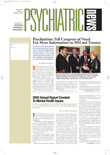How did Manhattan’s older population react to the World Trade Center bombings?
An answer—in a variety of ways—comes from James Nininger, M.D., a New York City psychiatrist and president of the New York State Psychiatric Association. He has a fairly good idea of how elderly people reacted since he has a subspecialty in geriatrics and treats a number of older patients. He also did some volunteer work on Pier 94, where some of the families of World Trade Center victims came for psychiatric help (Psychiatric News, October 5 and 19).
Many of Manhattan’s older persons, said Nininger, had experienced traumatic events in Europe during World War II. Thus, the attacks on the World Trade Center reawakened their memories of the earlier events and in numerous instances made them feel psychologically vulnerable. For instance, an 85-year-old Manhattan resident had experienced numerous bombings in Eastern Europe during the war. The attacks on the World Trade Center reactivated her memories of those bombings and shattered her belief that she was safe from such atrocities in America.
In contrast, Nininger said, many other older Manhattan residents took the attacks on the World Trade Center in stride. They were more concerned about the effects of the attacks on young Americans and their future than about the effects on themselves.
Still other seniors, Nininger reported, were already being treated for existing psychiatric disorders when the attacks occurred. Thus, when they experienced sadness, depression, insomnia, or other symptoms as a result of the attacks, they needed to be reassured that these symptoms were normal reactions to what had happened, not part of their preexisting psychological difficulties.
Some of the individuals who did not have a history of psychiatric illness nonetheless displayed acute psychological reactions to the World Trade Center attacks, he continued.
And finally, Nininger pointed out, some elderly people reacted in rather singular and intriguing ways to the catastrophic events. For instance, a 64-year-old woman had worked at the World Trade Center ever since it was erected some 30 years ago. Because she arrived at work late on September 11, it saved her life. Needless to say, she was sad about her coworkers who were killed in the disaster, but something else bothered her a lot as well—she had lost the place where she had worked for three decades. The eradication of the World Trade Center towers, in a sense, left her feeling homeless.
When Psychiatric News asked Nininger whether he had learned something from older New Yorkers’ reactions to the World Trade Center calamity, he replied: “I don’t know if I’ve learned something new. But it has reinforced what I had known already about how differently people, including seniors, react to events. It partly depended, of course, on the degree to which seniors were directly involved with the World Trade Center attacks. But it also depended on their own psychodynamics and their own histories and what the attacks personally meant to them. The catastrophe also reinforces, I think, the fact that the elderly are not always fragile, but often very resilient. It may be because they have been through stresses before. If an event is not too traumatic, they feel they are able to cope.”
Indeed, the woman who felt bereft of her “home”—the World Trade Center—said that she couldn’t wait for it to be rebuilt because she wanted to work there again. ▪
